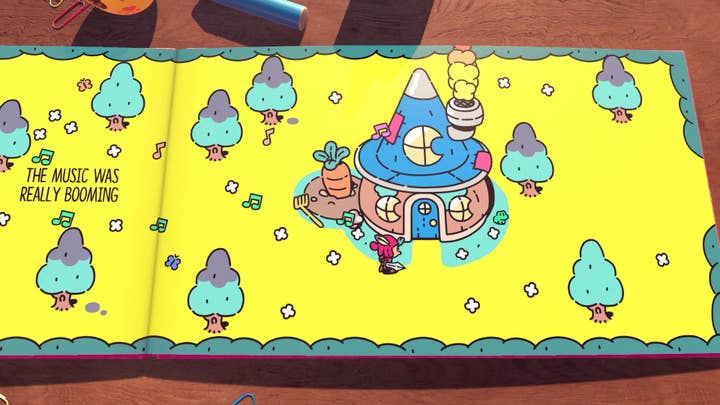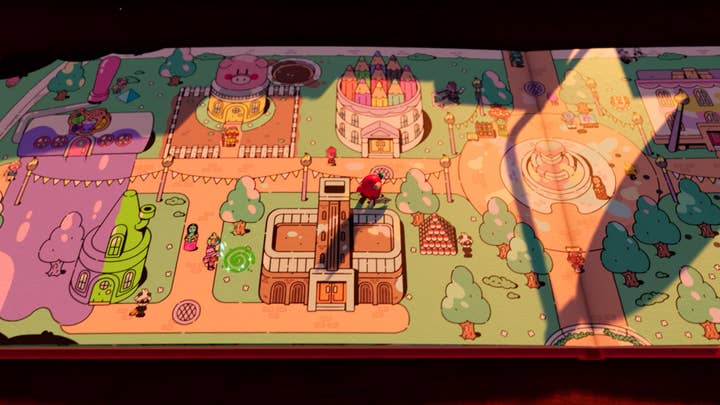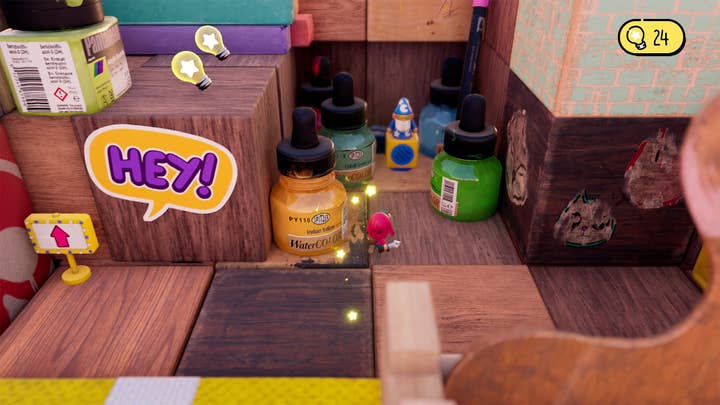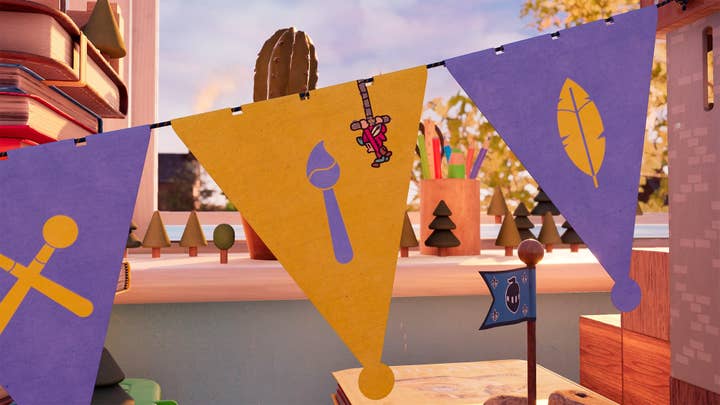There’s something uniquely exciting about a game with a novel twist, and that’s exactly what The Plucky Squire brings to the table.
All Possible Futures’ long-awaited debut title explores a perspective-shifting mechanic in a fresh way, with its characters existing inside a 2D book but able to jump out of it to explore the world in 3D around it. The title is launching today on PS5, Xbox Series, Switch, and PC, and was unveiled at its publisher Devolver Digital’s 2022 summer showcase – a reveal that the developers were eager to get out.
“We were always worried that someone from Nintendo, or Ubisoft, or just someone, would do a game where you’re a character in a book and you get out of the book – because it’s an idea that, as soon as you think of it, it just goes somewhere and you know there’s something in it,” Jonathan Biddle tells GamesIndustry.biz. All Possible Futures’ co-founder (and the game’s co-director) previously co-founded Curve Digital, leaving it in 2015 to become indie. He then went on to have great success with 2018’s action RPG The Swords of Ditto.
“We released the first trailer quite early because we were so worried about that, we thought what we had was so unique that if someone else had the same idea, we would be screwed basically,” he smiles.
“We thought what we had was so unique that if someone else had the same idea, we would be screwed basically”
This first trailer immediately garnered a lot of positive reactions and interest from players, which is down to the game’s exciting mechanics but also to the “message it’s sending,” Biddle says.
“It’s the heart in the game,” he continues. “People want to feel joy. And sometimes it’s lacking in video games. Obviously there’s a bunch of great video games around that do have plenty of joy in them, but the general way the games are going is becoming more serious, more grounded, more realistic. And we’re just trying to have fun. And people pick up on that and I think that’s why it’s gone somewhere.”
He says that the team loved seeing people’s reaction to the original trailer, witnessing the moment where it switches from 2D to 3D.
“There’s a mic drop when you leave the book. It was brilliant. We watched all these people’s reactions to it, all this kind of, mouth open, jaw on the floor stuff, and it was perfect. It was exactly what we were trying to do and when it hit like that, it was really satisfying. And after that we knew that we had something that people were really interested in.”
The jaw-dropping effect of the trailer even helped the team’s recruitment effort.
“We were trying to hire people and we couldn’t get anyone because you’re advertising on some forum, like, ‘Hey everyone, we’ve got a cool game.’ Everyone else says they’ve got a cool game as well, and [we] just couldn’t get anyone in. Once we put the trailer out, people were like, ‘Ooh, they have got a cool game’, and people started applying.
“And that was one of the really useful things about that trailer – it brought people in that helped us actually make the game. So in a way, it was an advertisement for us as well as a stick in the sand. So [we could] say, ‘This is what we’re doing and we got here first, pay attention’.”
A lot of The Plucky Squire’s core ideas were there from the very beginning of development, stemming from characters made by All Possible Futures’ other co-founder, James Turner (previously at Game Freak as art director on Pokémon). The idea of a 3D book is what first emerged.
“And that’s really when we’re like, well, if you’ve got this 3D book, how about you get out of the book and go on the desk? From that moment onwards, it’s a game that revealed itself to us,” says Biddle. “We incrementally went through development answering questions of: can we get a character on a book to animate? Does Unreal work with 2D? If we move the character to the edge of the book and we turn them into a 3D character, does that work?
“At any point, the answer could have been ‘no, you can’t do that actually, it’s too complicated’. But each step along the way was very much: yes. I’ve always developed that way anyway, I like to start with something small, and then layer it. That’s my sweet spot, really, building something complicated out of something small.”

From this initial idea of characters coming out of a ‘physical’ book, the team made a 25-minute demo which captured how the title meshes things together (genres, perspectives) in an interesting way.
“And at that point, I think we had the game, pretty much as it is now, just in a nascent form. Most of the ideas that you see now are just much more developed versions of what we had in that original demo. So in some respects, what we have right now is exactly what we envisaged. We always say that Jamie comes from the top down, like characters, world, story, and I come from the bottom up, like nuts and bolts. How does this work? How does that feel? We’re meeting in the middle, and we end up with a game like this, which is a product of those two ways of thinking.”
The game’s unique mechanics presented some challenges – lighting, for instance, was “really tricky to do,” Biddle says. The transition from 2D to 3D “happened quite easily” from a technical point of view though – unlike having one consistent camera.
“The camera sits in the room, and you are trying to track characters that are on a texture in the book in 3D, but your characters are upstairs above the room in 2D,” Biddle explains. “And so we have characters that will come out of the book and you’ll have to track them and they’ll run across, go into another piece of media like a mug. It tracks them again and moves around. Making that all seamless has been quite challenging, but also kind of fun for me,” he smiles.

Despite becoming the de facto technical lead for The Plucky Squire, Biddle doesn’t actually have a programming background – the team is smaller than the game’s polish suggests. Only four people worked on the original demo, and the team was composed of only 23 people at its peak (including contractors).
“I guess it is quite small – I always say, we’re actually kind of plucky, to be honest with you,” Biddle laughs. “We just get on, and do it. We fill the gaps that are there. Both Jamie and I have had lots of different roles, and we’ve been management in lots of different places. I was not originally a programmer. But the way that the game was being developed, it was code and design in the East, and mainly art in the West. I found myself as the lead tech in lots of ways, which is really strange because all the other programmers on the team are much better than me and much more experienced. I’d never led a tech team before, and this was a really complicated tech game!”
There’s been a fair share of titles with perspective shifts over the years, the most recognisable indie examples probably being Fez, Monument Valley or, more recently, Viewfinder. With the state of the industry being what it is, and The Plucky Squire bringing a fresh twist to the idea, we ask Biddle if being mechanically interesting is more important now than ever.
“I like to start with something small, and then layer it. That’s my sweet spot, building something complicated out of something small”
“I’m very wary of making generalisations because sometimes the kind of things that stick with people are not really what you expect, and to define what is unique is quite difficult sometimes,” he says. “And I think sometimes people who are making those games don’t realise it until it’s out there and then it blows up and they go ‘Oh shit!’. So I think it’s difficult to plan that stuff.”
This echoes what Ustwo Games’ Danny Gray told us when we looked back at Monument Valley for its tenth anniversary, talking about how it’s “impossible to manufacture a hit.”
“A lot of people are going to spend a lot of time working on a game that is mechanically interesting and they put years into it and it just doesn’t go anywhere,” Biddle continues. “And there’s so much luck involved and it’s very difficult to take this opportunity I guess.
“So if this game is a successful example, I can’t point to any part of it that I would say I could tell someone else to do, because in other situations, maybe we wouldn’t have been able to make this game a success. There’s so many factors. I [can] say ‘I’ve worked hard on this game, it should be a success’, but there’s people out there who’ve also worked as hard and it’s not been a success for them. So, it’s a really tricky question.
“I would say personally, I could not work on anything that wasn’t interesting. Because when you’re going into something like this, you’re saying, ‘This is four years of my life, how do I justify that to myself?’ There’s an opportunity cost every time you jump into a game’s development. If I go down this alley, is this the right alley? So for me, it has to be interesting and that comes before successful. And the second bit can follow if things align and if you get it right and you hit the zeitgeist and so on.”

As we discuss the different aspects of The Plucky Squire, its Zelda-like facets come up. The title suffered a couple of delays and is funnily enough now releasing within a few weeks of a new Zelda title, Echoes of Wisdom.
“You’re always going to go up against something,” Biddle notes. “When you start the game, you don’t think in the future. And then you’re hitting deadlines. And then you’re missing deadlines. And then you put the date back and you’re here, and then you miss it again. You put it back and everything is driven by, how good is this game? When is it gonna be ready? And it just so happens it’s a week before Zelda. And that’s what it is. I don’t want to release any later and we couldn’t have gone any earlier. So it’s not really a concern, it’s just a reality.”
He continues: “And you know, these days, [launch week] is the beginning, right? It is a journey that the game is on. So, people are interested in it and we’ll keep people interested in it and it doesn’t matter so much to me, I think. Plus, we’re multiplatform so that helps too.”
“Ideas are not the problem. With this game we had to really pull back. We knew there were so many directions we could go in”
We ask about the team’s vision past launch week then, whether it has ideas for the future of The Plucky Squire.
“Oh, ideas are not the problem,” Biddle laughs. “With this game we had to really pull back. We knew there were so many directions we could go in. Very early on [we] said, let’s only do one book because we knew that we could do more in the room for example, and we knew the scope would just expand so much. All of the abilities that are possible, moving between 2D and 3D, we really reeled it in. So some of those may come to the forefront now and we may develop this ‘series’ more. We have some ideas, nothing’s really been solidified yet so I actually don’t want to say too much. But it feels like the beginning. We’ve got something that really resonates with people, [that] we enjoy working on, and it’s actually quite freeing.
“There’s very little we can’t do in our game. If you look around many different genres, we can encase them in what we do, and we do quite often as well. We probably couldn’t be a first-person shooter but that’s probably a benefit,” he laughs.
Concluding our chat, we ask Biddle what he’s hoping for the launch today.
“It would be nice if it lived up to the potential that we originally saw in it. You know, along the way in any development, there are bumps on the road and it’s tricky to keep things on the tracks, and you may end up at the end, things didn’t go quite so well. I’ve done that a lot. So I think if we can live up to the hopes of what people see in it, and what they saw in it when they first saw the trailer, and that everyone enjoys it just as much as we hope they will, then that’s all we really want.”
